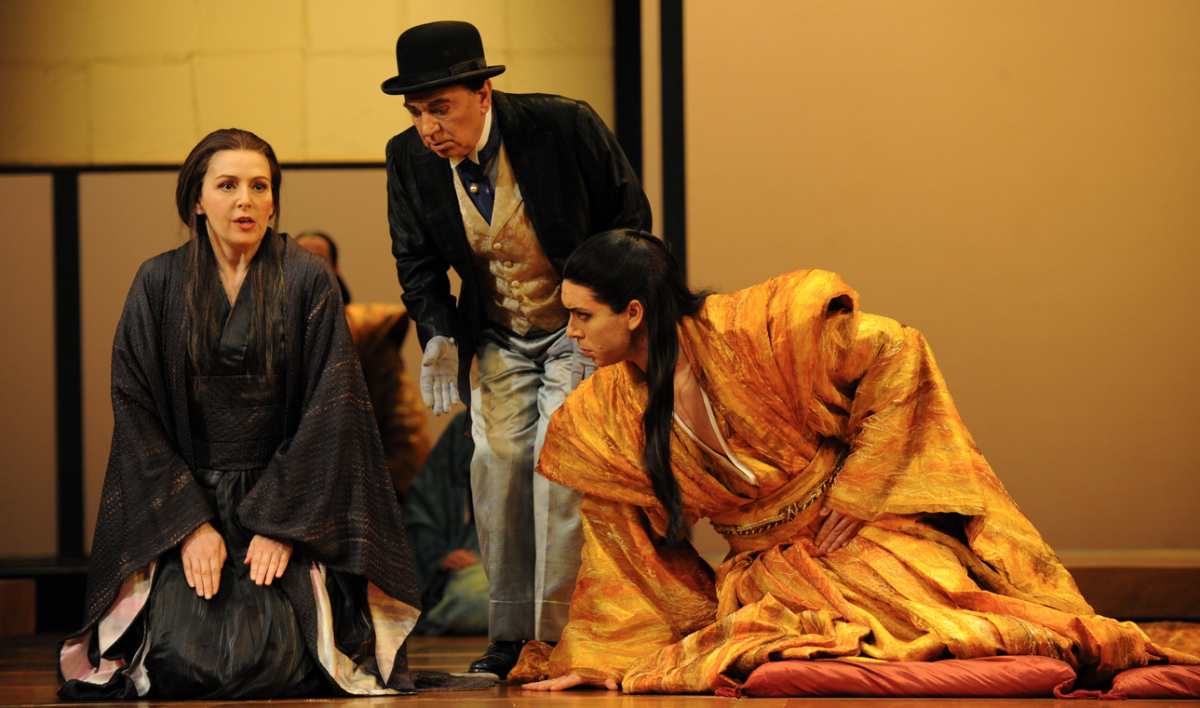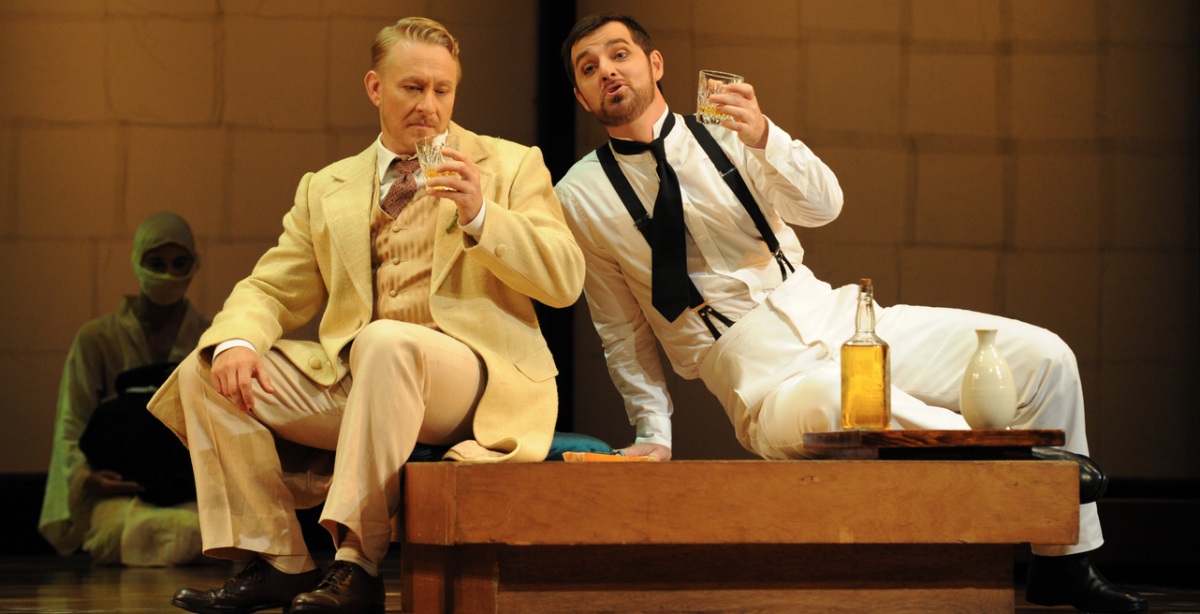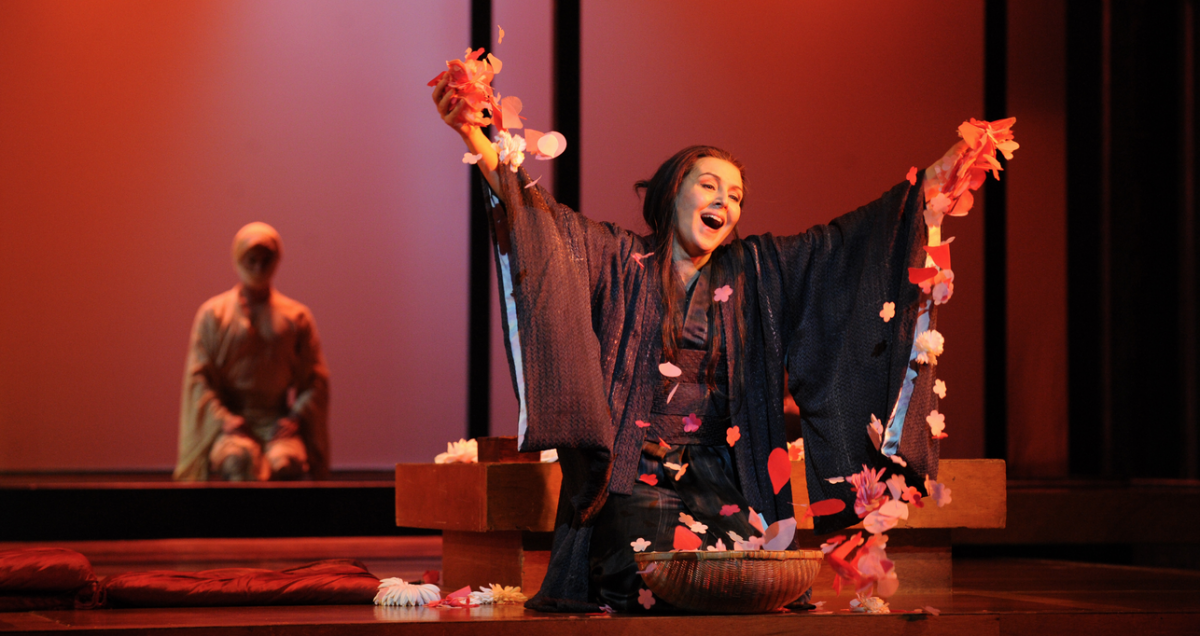So-so revival only manages a flutter compared to last year’s offering on the Harbour.
Joan Sutherland Theatre, Sydney Opera House
January 27, 2015
Don’t get me wrong, there’s nothing fundamentally amiss with Moffatt Oxenbould’s 18-year-old production of Puccini’s Madama Butterfly. It doesn’t creak at the seams, it has some very fine visual elements, not, least of which is a superb lighting design, and in the right vocal hands it would probably bear up better. It’s unfortunate, therefore, that it comes so soon after last year’s revolutionary Handa Opera production from the Spanish theatre company La Fura dels Baus, which found so many new and original things to say about the work, without resorting to the usual Japonisms.
 Alexia Voulgaridou, Graeme Macfarlane & Samuel Dundas
Alexia Voulgaridou, Graeme Macfarlane & Samuel Dundas
Not that Oxenbould himself embraces the Western view of Japan – he’s at pains to show us that world firmly through the eyes of a Pinkerton (ie. a skewed, misogynistic viewpoint) – but he clearly expects us to recognise the conceit, rather than passively endorsing it (as I suspect some of the less perceptive in his audience still might do). But by using stylised Japanese theatre techniques, especially in the first act, he’s inclined to distance us from Butterfly and her emotional dilemma, placing her centre stage as an object to be observed rather than one with which to empathise. Her arrival is over choreographed; her gestural collapse after the Bonze’s curse is theatrical, not visceral. Reducing the clutter of extra characters and drifting silks in the second half helps – it’s impossible not to feel for the simple, dark, kimono-clad figure – but still, Alex Ollé and his team last year found so much more to say about sexual, social and racial politics than is on offer here.
The plusses first of all, and Peter England’s and Russell Cohen’s clean limbed, Whistler-inspired set design provides an excellent theatrical space with its elegant moat emphasising Butterfly’s isolation along with that of Victorian Japan itself. There are some magnificent set pieces – the open up to reveal the distant moon and stars at the end of Act I and the flower duet and subsequent vigil stand out – and Robert Bryan’s lighting design is a series of eloquent miracles, making the most of what might seem a tricky ‘box set’. The floating candles are a magical stroke of genius!
 Michael Honeyman & James Egglestone
Michael Honeyman & James Egglestone
The casting in this revival is mixed. Greek soprano Alexia Voulgaridou had a success in Tosca for OA a couple of years ago. Her Butterfly is blessed with a strong, warm tone in the middle to upper register, generally fine diction and a firm bottom (though she can sound a little ‘mature’ down here). The top of the voice is a little perilous – she comes off most of her top notes as soon as is decently possible and skipped the floated D Flat in the entrance scene on opening night. There are some compensations, though, with her interestingly acted mix of naivety, naughtiness and blinkered devotion in Act II. At other times, however, her dramatic motivation lacks clarity, possibly a fault of the (re)-direction.
James Egglestone is her Pinkerton and he certainly looks the part, carrying off a fair amount of the acting required and getting roundly booed at his curtain call, presumably for his callow caddishness. It’s a pity, then, that vocally he really isn’t up to the role. Strained at the top, with a slightly dull, dry tone, he flags badly towards the end of Act I and loses consonants whenever required to go out on an emotional limb. Lacking the necessary Italianate ‘ping’ to the voice, he is occasionally swamped by the orchestra.
 Alexia Voulgaridou as Madama Butterfly
Alexia Voulgaridou as Madama Butterfly
The supporting cast is better. Sian Pendry makes a great deal of Suzuki, less of the shrinking servant than is sometimes the case. She sings the role with sumptuous tone, fearless at the bottom and with excellent diction. She allows the judgemental side of the character to emerge without ever pulling focus or losing sight of Suzuki’s ultimate love for her poor, deluded mistress. Michal Honeyman’s Sharpless has the right degree of censorious authority and gravitas and he sings it with firm, reliable tone throughout. Graeme Macfarlane’s Goro is in better voice than I recall him in the HOSH production, carrying off the role of duplicitous marriage broker with panache and without recourse to mugging.
In minor roles, Jud Arthur as a furious Bonze and Samuel Dundas are luxury casting, both offering fine voices and considered performances. Jane Ede makes a fine frosty Kate Pinkerton – her face an icy mask concealing a warm soprano voice. The Opera Australia chorus too were on excellent form – I’ve seldom heard a more lovely account of the Humming Chorus (excellently balanced for the auditorium too).
In the pit, maestro Gianluca Martinenghi conducts a perfectly fine, if unremarkable reading of Puccini’s magnificent score. There were moments of magic – the nocturne and dawn prelude, for example – but also moments that failed to fly like the orchestral stroke when Butterfly is first told that Pinkerton may never return, and crucially the playout to the entire opera (not helped by the static staging at that point).
I’m sure it pleased many in the opening night audience, but compared to OA’s other two revivals in its current Puccini-fest (Gale Edwards’ fine-grained Bohème and John Bell’s thinking-man’s Tosca), this Butterfly drifts rather than soars.
Madama Butterfly is at the Sydney Opera House until March 28.












Comments
Log in to join the conversation.